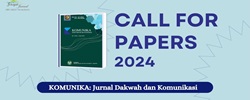TEORI KECERDASAN, PENDIDIKAN ANAK, DAN KOMUNIKASI DALAM KELUARGA
DOI:
https://doi.org/10.24090/komunika.v6i1.337Keywords:
multiple intelligences, brain, spiritual, spiritual intelligence, uniqueness, family communication.Abstract
The education system in Indonesia emphasize on academic intelligence, whichincludes only two or three aspects, more than on the other aspects of intelligence. For thatreason, many children who are not good at academic intelligence, but have good potentials inother aspects of intelligence, do not develop optimally. They are often considered and labeledas "stupid children" by the existing system. This phenomenon is on the contrary to the theoryof multiple intelligences proposed by Howard Gardner, who argues that intelligence is theability to solve various problems in life and produce products or services that are useful invarious aspects of life.Human intelligence is a combination of various general and specific abilities. Thistheory is different from the concept of IQ (intelligence quotient) that involves only languageskills, mathematical, and spatial logics. According to Gardner, there are nine aspects ofintelligence and its potential indicators to be developed by each child born without a braindefect. What Gardner suggested can be considered as a starting point to a perspective thatevery child has a unique individual intelligence. Parents have to treat and educate theirchildren proportionally and equitably. This treatment will lead to a pattern of education that isfriendly to the brain and to the plurality of children’s potential.More than the above points, the notion that multiple intelligences do not just comefrom the brain needs to be followed. Humans actually have different immaterial (spiritual)aspects that do not refer to brain functions. The belief in spiritual aspects and its potentialsmeans that human beings have various capacities and they differ from physical capacities.This is what needs to be addressed from the perspective of education today. The philosophyand perspective on education of the educators, education stakeholders, and especially parents,are the first major issue to be addressed. With this step, every educational activity andcommunication within the family is expected to develop every aspect of children'sintelligence, especially the spiritual intelligence.Downloads
Download data is not yet available.
Downloads
How to Cite
Fuad, M. (2015). TEORI KECERDASAN, PENDIDIKAN ANAK, DAN KOMUNIKASI DALAM KELUARGA. KOMUNIKA: Jurnal Dakwah Dan Komunikasi, 6(1). https://doi.org/10.24090/komunika.v6i1.337
Issue
Section
Articles
License
Authors who publish with this journal agree to the following terms:
- Authors retain copyright and grant the journal right of first publication with the work simultaneously licensed under a Creative Commons Attribution-ShareAlike 4.0 International License that allows others to share the work with an acknowledgement of the work's authorship and initial publication in this journal.
- Authors are able to enter into separate, additional contractual arrangements for the non-exclusive distribution of the journal's published version of the work (e.g., post it to an institutional repository or publish it in a book), with an acknowledgement of its initial publication in this journal.
- Authors are permitted and encouraged to post their work online (e.g., in institutional repositories or on their website) prior to and during the submission process, as it can lead to productive exchanges, as well as earlier and greater citation of published work (See The Effect of Open Access).



























